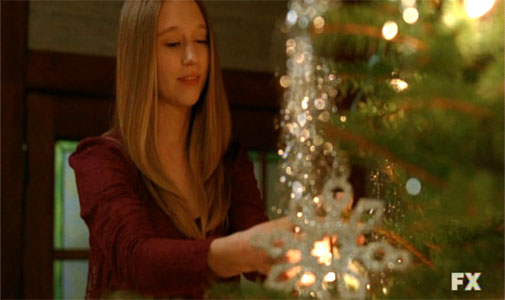
It's been a week since American Horror Story concluded its first season -- more than long enough, in my book, to talk about it. But if you want to protect yourself from exposure to what's happening on that fine, bold FX series, then stop reading. Especially since I want to talk not only about what happened last week, but what's going to happen next season...
First, the first-season finale.
American Horror Story may have set a record, as it neared the Season 1 finish line, by killing off the three members of its central family in as many weeks.
First, in a shocker, daughter Violet (Tessa Farmiga) was revealed to have killed herself, with a drug overdose, and not been aware of it. So when we were seeing Violet interact with her family, and with other ghosts in the house, she, too, had become a restless spirit, doomed to reside in the house forever.
Then, the next week, Violet's mother, Vivien (Connie Britton), had her twin babies in a home childbirth -- one child angelic, the other demonic. Another surprise: Vivien didn't survive the delivery. She, too, was now a ghost.
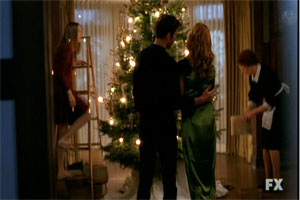
That left Violet's father, Ben (Dylan McDermott), as the family's sole survivor -- until, in the first-season finale, determined to leave the "Death House," he was attacked by malevolent spirits and hung from the rafters.
That's three weeks, three deaths. Violet, Vivien, Ben -- dead, dead, dead.
Yet in one of the show's most warped twists of all, in death those troubled characters all found happiness. So much so that, with help from the housekeeper Moira (Frances Conroy), they put up and decorated a Christmas tree, to the tune of "The Little Drummer Boy."
Vivien had been reunited with her "good" baby, and finally gotten the baby she had desperately hoped for all along. Violet was away from the bullies at school, her insane ghostly ex-boyfriend in the house, and happy to just hang out with her parents. And Ben, while being well hung from the chandelier, had managed to reunite his nuclear family.
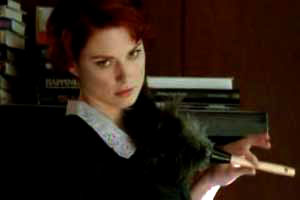
We knew Ben, like his family, was "healed," because when he looked at the housekeeper, he now saw the elderly Moira -- not the sultry, sexual-predator younger version played by Alexandra Breckenridge, who appeared only to men with unchecked libidos and unfaithful pasts.
And then, as a three-years-later postscript, we check in on Constance (Jessica Lange), who's been caring for a young one -- the satanic evil-twin spawn from Vivien's womb -- and finally goes out to get her hair done, leaving the child in the care of a housekeeper.
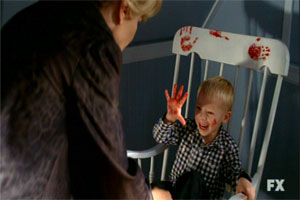
When Constance returns, the woman is dead, lying in a pool of her own blood in the boy's room. The boy is there, too, greeting Constance with a wave of his bloody hand and a wide, wicked smile.
"Now what am I going to do with you?" she asks, revealing an expression that is more smile and anticipation than fear and revulsion.
It was a fabulous set-up to Season 2 -- except it won't be.
Series co-creator Ryan Murphy revealed last week, just after the season finale aired on FX, that Season 2 of American Horror Story would take place in a completely different locale, featuring a completely different set of characters.
He was not, however, wiping the slate clean completely. He hinted that some, or many, of this season's actors might return for Season 2, just playing different roles, supporting a newly hired core group of performers.
How audacious is that? And yet, how very, very interesting.
It appears, now, that Season 1 of American Horror Story is a closed book, with its story line not to be revisited or fully explained. The unanswered questions will linger, tantalizingly, for fans to argue about, like the true meaning of the blackout ending of The Sopranos.
Why was Moira, alone among all the ghosts, allowed to age in one spectral form (the only spirit to do so), while retaining a second, slinky alter ego occupying the same space? Why, if some ghosts sported traces of their fatal wounds, did Ben not have a broken neck? And why...
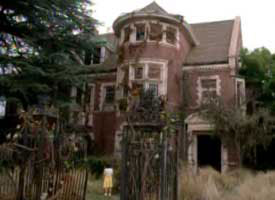
Oh, but why go on? It's more fun, now, to look ahead.
Because if Murphy indeed does what he suggests he and series co-creator Brad Falchuk may be planning, American Horror Story is about to go into largely uncharted TV territory.
The risk, of turning a drama series into a sort of repertory company, is that familiar faces in new roles may lessen the inherent drama, tension and danger. The reward is the sheer fun of it. Imagine: If Connie Britton played a morose, increasingly pregnant, unhappily married woman in Season 1, think of how much fun it would be -- for her, as well as for viewers -- to see her do a complete about-face for Season 2.
There have been drama series on TV with recurring players before - but not many. In fact, I know of only two -- though I'd love to be corrected and learn of more.
The first was NBC's The Richard Boone Show, a one-season anthology series from 1963-64. Boone was the host of all shows, and star of many, but sometimes other members of his repertory company would take the lead, or swap out supporting roles.
Among that pioneering show's regular company of rep players: Harry Morgan, Robert Blake and Bethel Leslie.
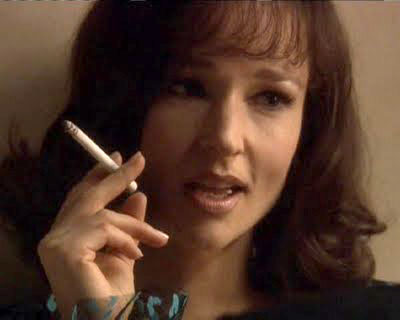
The second series to take a rep-company approach, from 2001-2002, was A&E's A Nero Wolfe Mystery, which had a pair of stars -- Maury Chaykin as Rex Stout's well-heeled detective, and Timothy Hutton as Wolfe's assistant, Archie -- who played the same leading roles each week.
They were surrounded, however, by a rep company of actors who would play different parts in different episodes. Kari Matchett, for example, played 11 different roles, from loyal girlfriends to femmes fatale (one of whom is seen at right).
That's two rep-company TV dramas in more than 50 years of television.
And now, American Horror Story may make three.
Given its enviably talented cast -- everyone from Britton and Lange to supporting players Denis O'Hare and Conroy -- I hope it does.